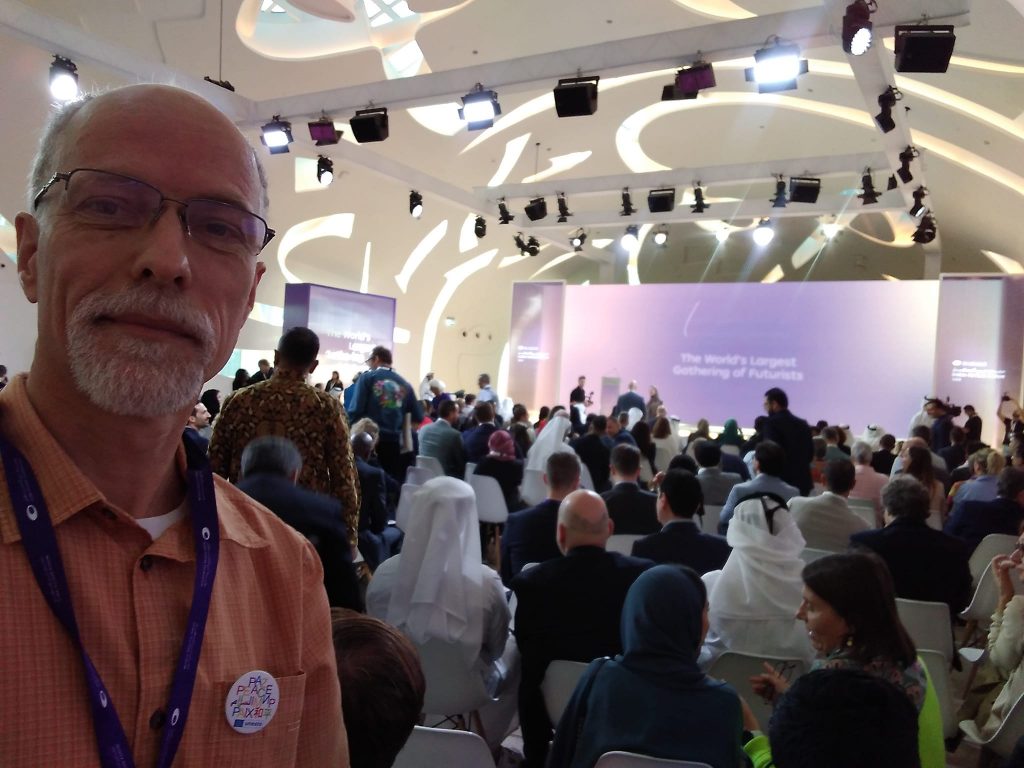Dubai Future Forum
2023-11-28
Cornelius Holtorf was invited to attend and speak at the Dubai Future Forum in Dubai, UAE. (27-28 November 2023). A total of 150 invited speakers presented in some 70 sessions, with ca 800 participants from close to 100 countries. The conference ended only two days before the start of COP28 and some participants stayed on.
As you can see on the image, I was wearing my UNESCO badge for global peace. Otherwise, various ongoing wars did not feature much during the entire event.
Close to 100 people attended our session, which was entitled Heritage Futures: How Does Culture Shape Tomorrow? In the session we wanted to introduce the concept of heritage futures to the global futurists:
This session is about ‘Heritage Futures’ which stands at the intersection of past legacies and tomorrow’s possibilities. We will discuss how culture shapes the world of tomorrow. Heritage is not just about conserving relics and memories of the past, but about making them resonate in an evolving world – and learning new ways to approach the future through care.
A recording of the session is now available on YouTube.
Other highlights of the conference included otherwise the experience of futures thinking in Dubai where the leadership has been developing ambitious futures programmes for many decades. This includes not only infrastructure and technology projects but also the Dubai Future Foundation and the Museum of the Future where the conference took place. Much of this rests on the income from oil which was discovered here as late as 1958 and enabled the country to have a stunning development. By 2071, the UAE aspires to be “the best country of the world,” as Ohood Al Roumi, the country’s Minister of the Future put it.
Although people were mentioned frequently, the themes of most of the keynotes and general panels revolved around technology (incl space and AI), energy (but not much on oil!), business, policy-making, health and food. There was very little about understanding people and appreciating various cultural ways of making sense of the world.
Some memorable quotes:
“We need to have the future at the table as well as on the menue,” Angela Wilkinson, World Energy Council
“Most countries don’t have long-term goals,” Sophie Howe, first Future Generations Commissioner for Wales
“What matters is not the assets but their value,” Michael Clark, Mastercard
“Create the future, not just adapt!”, Adam Kahane, Reos Partners
“Our best futures need your magic as an alchemist,” Sarah de Vanzo, Pierre Fabre
“The future belongs to those who dare to imagine it,” David Alabo, digital artist
“If we are following trends, we are too late,” Benjamin Moncrieffe, Jaguar Land Rover
Perhaps most importantly, at least from my perspective, we were briefed in one session on the run-up to the UN Summit of the Future in September 2024. If anybody else is interested, click here for more information and the chance to sign up for continuous information provided by the School of International Futures and Foundations for Tomorrow.






[…] The new funding for this and a number of additional smaller projects, means that the Climate Heritage Network is…
[…] Chair on Heritage Futures « Culture, cultural heritage and COP26 […]
[…] mer på Unescoprofessurens blogg http://blogg.lnu.se/unesco/?p=1061 Besök Öland 2050! […]